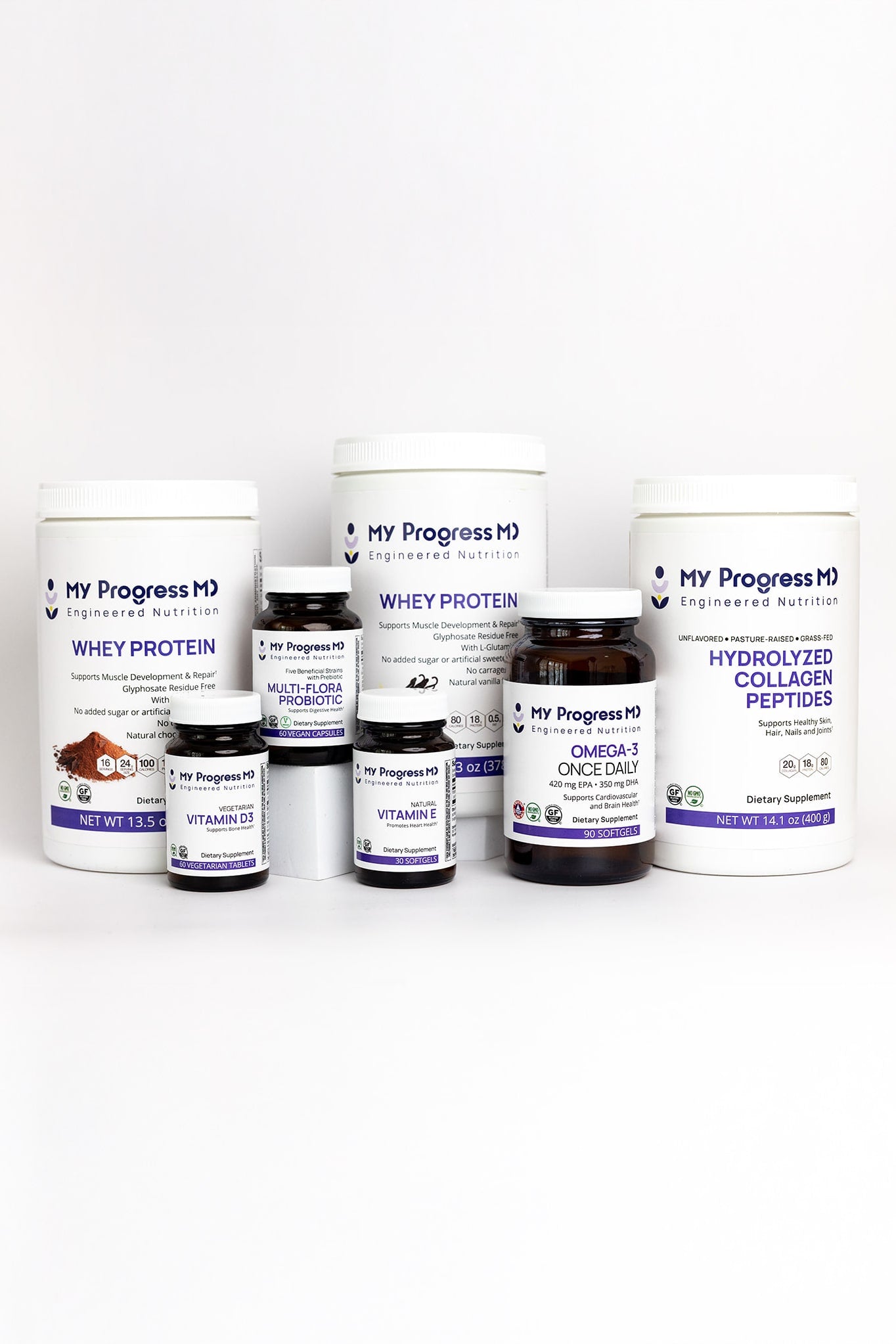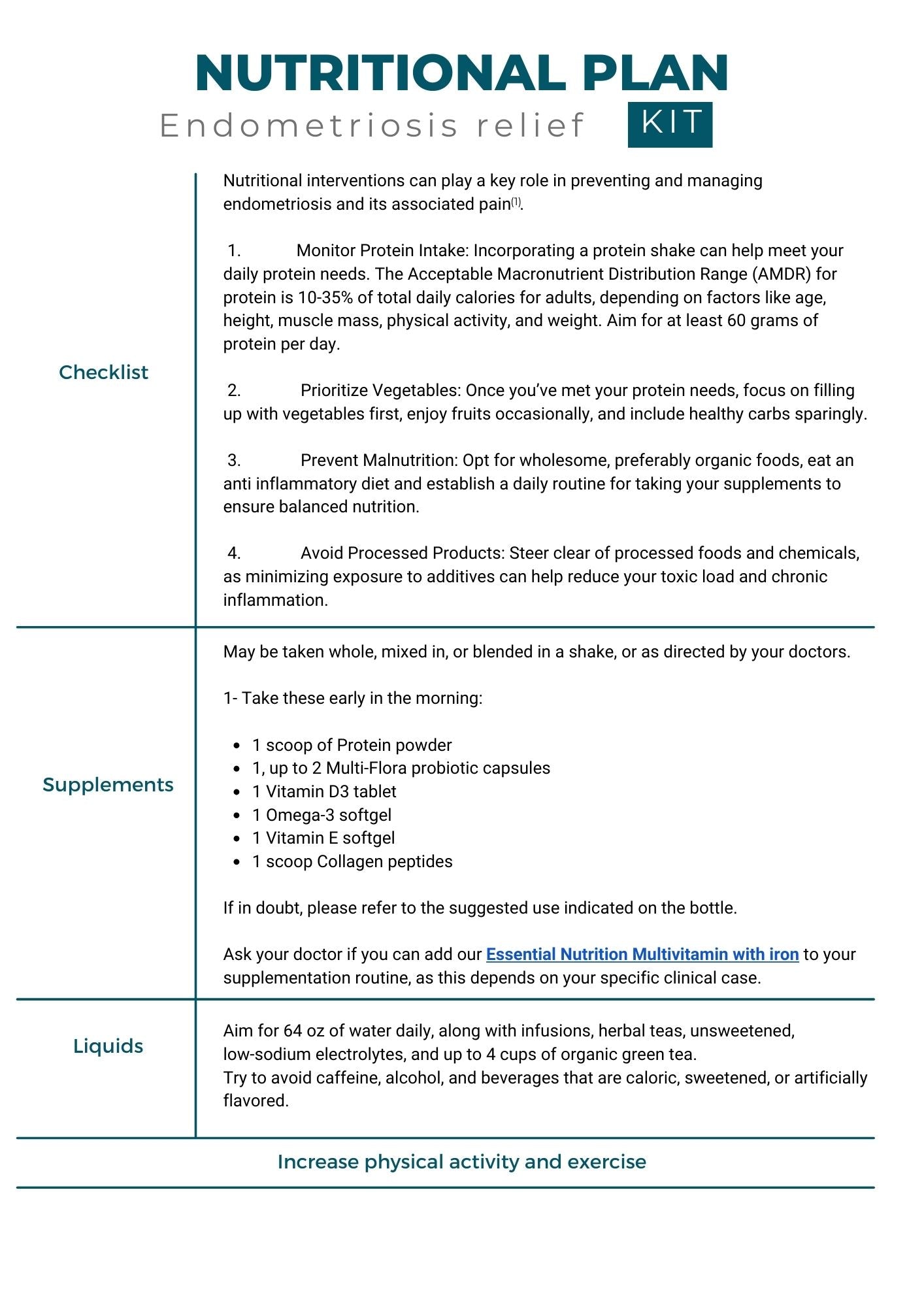At MyProgressMD, we don't just offer high-quality products, but we provide a complete system for healthier lifestyles. Each kit receives a specialized plan with instructions on how to best utilize the kit and optimize your nutrition. Make sure to download yours when you purchase a kit.
ENDOMETRIOSIS RELIEF NUTRITIONAL PLAN
Endometriosis can feel overwhelming, but you don’t have to navigate it alone. We’ve developed a comprehensive solution that provides a clear path to symptom relief. Our Nutritional Plan for Endometriosis is specifically designed to support your body’s natural healing process by reducing inflammation and balancing hormones, with a focus on lowering estrogen levels through targeted food choices and supplements.
Our specially formulated supplements work in synergy with the anti-inflammatory nutrition plan, helping to ease pain and boost overall well-being. With this roadmap, the guesswork is gone—you’ll know exactly what to eat and which supplements to take, so you can effectively manage symptoms, balance hormones, and regain control of your health naturally.
Explore our Nutritional Plan and Supplements and begin your journey to feeling your best today!
THE BASICS
Prioritize vegetables first, followed by quality unprocessed protein and healthy fats.
Vegetables are an excellent source of fiber, which helps prevent constipation, feeds beneficial gut bacteria, and supports a healthy estrobolome—a collection of gut bacteria that metabolize and regulate circulating estrogen. Along with fiber, vegetables provide key nutrients such vitamin C, which acts as an antioxidant, aids iron absorption, and supports collagen production. Together with vitamin E, these nutrients can help alleviate symptoms of endometriosis.
High quality protein is essential for maintaining and repairing tissues, producing hormones, and supporting a robust immune system. Since it plays a critical role in balancing hormones and overall health, incorporating unprocessed whole protein food sources into your diet is vital. Our glyphosate-free protein shake offers a clean, non-toxic option that provides the high-quality protein needed to support these functions and achieve optimal well-being.
Collagen is essential for the structure and function of connective tissues. In addition, it is a natural healing nutrient for the digestive tract.
Other important vitamins, like vitamin D, have been shown to reduce endometrial pain by boosting antioxidant capacity.
Carbohydrates can be included in small amounts, but only after consuming vegetables and protein first. Opt for nutrient-rich carbs like fruits and whole grains such as quinoa, potatoes, and rice. For example, a balanced day might include a protein shake with a piece of fruit and some nuts for breakfast, chicken with a salad for lunch, and a serving of meat with sautéed vegetables for dinner, aiming for about 70 grams of protein in total.
Healthy fats and oils, should be included in your diet in small amounts, like a condiment. While they are biologically necessary, keeping portions moderate will prevent excess intake.
This kit includes the following items:
- 2 bottles Whey protein powder
- 1 bottle Omega 3
- 1 bottle Vitamin E
- 1 bottle Vitamin D
- 1 bottle Multi-flora Probiotic
- 1 scoop Hydrolized Collagen Peptides
References:
Barnard ND, Holtz DN, Schmidt N, Kolipaka S, Hata E, Sutton M, Znayenko-Miller T, Hazen ND, Cobb C, Kahleova H. Nutrition in the prevention and treatment of endometriosis: A review. Front Nutr. 2023 Feb 17;10:1089891. doi: 10.3389/fnut.2023.1089891. PMID: 36875844; PMCID: PMC9983692.
T Aigner, J Stöve, Collagens—major component of the physiological cartilage matrix, major target of cartilage degeneration, major tool in cartilage repair,
Advanced Drug Delivery Reviews, Volume 55, Issue 12, 2003, Pages 1569-1593, ISSN 0169-409X, https://doi.org/10.1016/j.addr.2003.08.009.


























